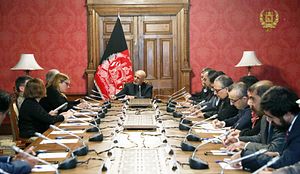As the United States mulls withdrawal from Afghanistan, recent media coverage has been punctuated with defeatism. It’s a stark contrast with the overwhelming optimism of the Afghan people for a future of peace with liberty and dignity, which is achievable with continued international support.
As an Afghan citizen — who from 1979 to 2001 experienced first-hand the atrocities of the Taliban, factional infighting, and the Soviet occupation of Afghanistan — I can warn that the United States would regret abandoning Afghanistan prematurely and irresponsibly again.
Let’s review history: like U.S. President Donald Trump, former President Bill Clinton put domestic priorities over peacebuilding missions overseas, famously stating, “It’s the economy stupid.” This underpinned Clinton’s decision to halt spending on the post-Cold War stabilization and reconstruction of Afghanistan, after the Soviet occupation forces withdrew from the country and the communist regime, which they had been backing, collapsed in 1992.
Indeed, the Afghan people felt betrayed when the U.S.-led “Free World,” on whose behalf Afghans had fought and defeated the Soviet forces, disengaged from Afghanistan in the 1990s. But President Clinton’s fateful decision came back to haunt the Bush administration less than a decade later. The U.S. negligence of Afghanistan enabled the country’s takeover by the radical Taliban who harbored al-Qaeda and later refused to hand over Osama bin Laden to the United States, even after he had successfully organized and implemented the 9/11 terrorist attacks on Americans.
Hence, the commonsensical question: why should the U.S. repeat the same mistake it once made, which forced its reintervention in Afghanistan in the first place? Will domestic “politics get in the way of strategy” again where a legitimate, UN-mandated winnable mission for peace and democracy, unlike Iraq and Syria, is disregarded for further support?
Of course, as a strategist with foresight, President Trump doesn’t have to repeat the same past mistakes on Afghanistan. He can rethink his decision by sticking to his South Asia Strategy, in line with which Afghan President Ashraf Ghani had made an unprecedented peace offer to the Taliban with no preconditions.
Last November in Geneva, President Ghani reaffirmed his firm commitment to immediate, direct talks with the Taliban for negotiating a sustainable, win-win political settlement. The key outcome of such a settlement seeks an honorable withdrawal of international forces from Afghanistan against a self-inflicted “honorable capitulation,” which entails far-reaching repercussions for the U.S. national security and international peace. 9/11 is a timeless reminder of the danger.
M. Ashraf Haidari is Afghanistan’s ambassador to Sri Lanka and a senior international security fellow at New America in Washington DC.

































